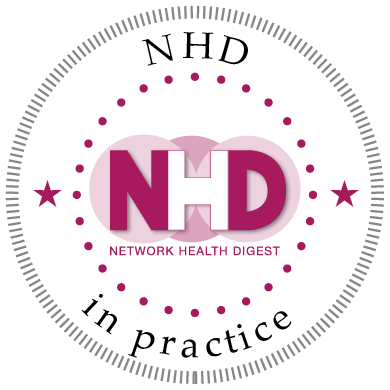Emma writes...
Thoughts, resources and comment from the NHD Editor.
#DW2025: The Future of Dietetics
Once again it’s our week to shine!
Dietitians Week is back and this year’s theme of ‘the future of dietetics’ is here to inspire creativity and innovation, embrace the future of things to come and encourage dietetic careers for life!
The week is all about exploring what could lie ahead for the profession and how it can move with the times; keeping up with the rapid changes in technology, new evidence and expectations, diversifying career paths, and evolving patient groups.
Over the week, there are daily themes to take us on a journey into the future and get us thinking about what could be possible and how we can protect and support dietetics for the foreseeable.
Let’s take a look at the daily themes for the week and where NHD sees things going.
1. Monday – What’s in your crystal ball?
What does the future of dietetics look like? Predictions for the future? What areas of dietetics are yet to be explored?
The future of dietetics looks good! There are still so many areas it has yet to reach and some we are only just starting to explore. Whilst we have a wealth of information and data regarding disease and the role of nutrition, there is still much to learn. Research is a fundamental part of growing our database, allowing us to develop more informed treatment approaches and potentially improve outcomes. How we conduct research and analyse our data could alter as more technological support becomes available. Harnessing the benefits of AI in research may offer the potential to automate more research techniques, reduce bias, and employ more robust analysis techniques with the ability to cope with very large datasets.
Data and knowledge are one thing, but applying them effectively is another. At a grassroots level, where healthcare professionals see patients or clients, the application of evidence-based practice will continue to be a core principle of what we do.
Other things to work on for the future include:
Better pooling and alignment of evidence and practice, which are key to offering quality treatment to all who need it;
Funding for appropriate and targeted services, which is also vital for the effective functioning of future health support.
The state of the food chain, where there are many concerns about negative health implications if current issues around ultra-processed foods or food and drinks that are high in fat, salt or sugar, are not addressed.
To support these aspects, more dietetic representation at the legislative and policymaker level is required.
These may be areas that are not new, and dietetics has already touched on them, but further exploration and leadership in these areas will support the development of the profession and drive better health outcomes for people.
2. Tuesday – How is tech making your working life easier?
How is technology supporting the profession? Are there some jobs the you’d like tech to take on so you have more time to work on other things? Is tech making your life easier?
Technology is a wonderful thing… when it works well! Otherwise, it can be a real pain in the neck.
Having tech that supports the day to day tasks that we all love to hate would be great – in some ways it’s brilliant that AI can write an essay for you, or generate a blog or social media post, but to be honest, I’d be ecstatic if it’d do my washing and ironing for me, AND put the clothes away at the end.
However, this may be a way off yet! Until such time, there is the potential to use tech to help us know what patients and clients need to effectively manage their condition. This could be in the form of more advanced dietary analysis and tracking tools, which offer real-time updates and feedback to patients or clients. Or the use of genetic technology, which targets individual make-up and personalised health goals.
Food security and sustainability are global concerns. The technology of the future may support the development of more sustainable farming and distribution methods and lend itself to analysing the most effective ways to produce food in challenging circumstances, eg, where the climate is harsh or unpredictable. Genetically modified foods have been viewed with caution over many years; however, there may be scope for more utilisation of them to produce crops and protein sources that are more robust and resistant to disease to fulfil the ever-growing demands on the food chain.
3. Wednesday – Celebrating progress!
Who do you know who deserves a thank you? Who would you like to pay tribute to?
This is a tough one to decide, as there are many people I’ve worked with over the years who’ve been phenomenal in their work and the projects they’ve completed.
I think it’s fitting to say a huge thank you to all of the writers who’ve contributed to NHD over the years. Without them, the magazine wouldn’t be able to bring the latest nutrition information and insights to you, our readers. Each year, there are new topics to explore and our writers never fail to deliver material that readers need or want to know. Every issue is a little goldmine of information and dedication to the nutrition and dietetics profession, and I’m very proud to be a small part of that each time.
This is also a great opportunity to celebrate our readers, some of whom have been with us from the start of their careers and have taken the time to send us feedback about their journey with NHD. Whether you’re a long long-standing reader or you’re new to NHD, thank you for your support and for spending your time with us.
4. Thursday – The pioneers of dietetics
Innovation is part of the dietetic profession, but who would you consider as pioneering? Perhaps some unsung heroes that have supported you and your career or directed your practice.
Over the course of my career, I’ve been lucky to work in the NHS as a clinician, as a freelancer in various settings including schools, universities and for NHD ; and currently as a regulatory and quality professional in the medical nutrition industry.
There have been several clinical and non-clinical colleagues and mentors who’ve supported my career journey, for which I am very grateful. As a young NHS dietitian, there were several highly experienced dietitians (plus consultants and speech and language therapists) who gave great advice and encouragement and whom I learned a lot from by engaging in MDT working and projects alongside them.
There are certainly a number of key people without whom I probably wouldn’t have made the step from the clinical setting into industry, or had the confidence or resources to develop the current phase of my career path. Whilst working in industry, I’ve had the privilege to work alongside many innovative people who are experts in product development, research, marketing, academia and policy making. All of which have added to my career development and supported me in my achievements. However, a particularly significant career development moment occurred back in my clinical years when working alongside senior dietitians who wrote for NHD provided me with the opportunity to become a writer myself, eventually leading to being the Editor a few years later.
5. Friday – What excites you about your future in dietetics?
What are you most excited about? What areas would you like to develop in? Do you have any big goals in mind?
I’m always excited to see what comes next within our profession. Whichever way we look at it, people need to eat and we’ll always be part of that for whatever reason.
I’m excited to see product innovation and developments where patients or clients experience significant improvements or remission for their condition. I’m excited to continue my work in the medical nutrition industry, supporting the dietetic profession with tools and services to manage patients or clients effectively.
I’m also very keen to support the diversity of dietetics roles. Wherever dietitians choose to work, we’re all ambassadors for the profession and there to make a difference for those we support. I’d like to see a dietetic profession which grows and expands into areas where dietetic representation is much needed, way beyond the clinical sphere.
I want to see more future dietitians armed with the knowledge, expertise and confidence to challenge nutrition practice, policy and legislation which isn’t as effective as it could be, and have the ability to influence them for better outcomes and efficacy.
Finally, I’m always excited to see what NHD brings to you next. We’re always working behind the scenes to improve and deliver the content and features you get to know and love. As we reach our 200th issue this month, it’s really exciting to wonder what will come in the next 200 issues! It might be a long shot, but perhaps the 400th issue of NHD might include articles on how to eat well on Mars and the nutritional benefits of the latest protein sources from a galaxy far far away... Emma

Emma has been a Registered Dietitian for over 18 years and has experience in adult and paediatric dietetics. She has been the Editor of NHD for nine years, steering the editorial content and supporting the production process.
Emma currently works in industry.





